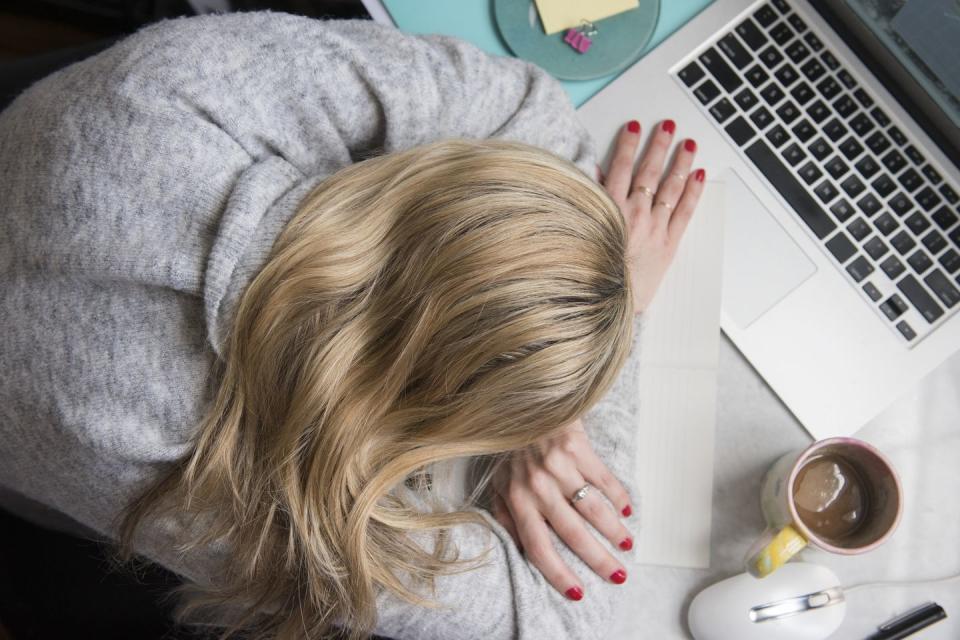Why you need to give yourself a break right now (and how to do that)

We're still in our third lockdown, and it feels very different from the first. Gone is the urge to whip up some banana bread, or learn a new language. No more do we wish to watch endless Instagram Lives about organising our wardrobe, or using all our 'spare time' to finally launch that side hustle. This time around, we're tired. We're fed up. Just getting through each day is a victory in itself. Of course, the long, dark evenings and miserable weather don't help - alongside not knowing exactly when this is going to end - and a lack of any obvious results or reward is prompting many to break the lockdown restrictions.
Such difficult circumstances call for more effective coping mechanisms. Whether you're struggling with working from home, worrying that your homeschooling isn't up to scratch, or are giving up your time to protect and support others as a key worker, chances are you're probably feeling low, unmotivated and a little helpless. Perhaps you're finding it difficult to stay positive, or are convinced that everyone's doing a better job than you are. Maybe you feel overwhelmed with how much you have to deal with, or are in despair over the constant barrage of bad news. The answer, first and foremost, according to executive coach Lisa Quinn, is to give yourself a break.
Below, Quinn shares her advice for getting through lockdown 3.0 as best you can.
1/ Don't hold yourself to pre-pandemic standards
Don’t treat this month like any regular month. When have you ever endured a pandemic before? You haven’t. And yet we’re all still holding ourselves to the same expectations as “normal”.
If you are struggling at the moment, it might help to understand the impact that the stress of Covid-19 is having on your brain. The bit of our brain responsible for planning, organisation and focus is called the Prefrontal cortex (PFC). It’s a bit like a battery. When we’re stressed, our PFC wears down. This makes it easier for the fear response in our brain to kick in, pumping out chemicals like adrenaline and cortisol; a useful response when we needed to run away from sabre-tooth tigers, but it can leave us feeling exhausted, edgy and anxious. Try not to give yourself a hard time for your brain doing its job and instead be as compassionate to yourself as possible.
2/ Be realistic about what you can actually accomplish
Start with establishing how you actually feel, rather than how you would like to be feeling, and let go of the “shoulds”. By this I mean being realistic about what’s possible for you. What’s possible for us changes from hour to hour, minute by minute. Yesterday, I absolutely did not feel like a run was possible (even though I felt I “should” go for one). Today, I feel like I can go for one.
3/ Acknowledge if you're feeling overwhelmed
Being in lockdown is overwhelming. We’re living under strict rules about what we can and can’t do; we can’t see people we love, our freedoms are curtailed, and we’re being bombarded with grim statistics and warnings every day.
Feeling overwhelmed isn’t a sign of weakness: it’s a sign of being human.
It can be helpful to try and notice and label your feelings: “I feel overwhelmed.” You might want to say it aloud. Make sure you say “I feel” rather than “I am”. That distinction is important. Feelings are like weather systems - they come and they go; they aren’t permanent. Sometimes allowing that feeling to surface, and to be noticed, is enough for it to shift a little. Try and have compassion for yourself and what you are feeling right now – it’s a very normal response to what we’re all going through. But, if you feel that your level of overwhelm is at a point where you are struggling, please ask for help. Your GP is a good place to start. Don’t feel you have to struggle through on your own.
4/ Don't compare yourself to others - particularly on social media
When we scroll through social media, or see other people with lives that we perceive to be better than ours, it tends to make us feel bad. This is because our brains are hard-wired to seek out threats – and someone with a life that looks more "perfect" feels like a threat. Firstly, notice how comparing yourself to other people makes you feel. If I spend too much time scrolling, I can literally feel it in my body – my jaw tightens, as does my chest. See if you can notice how your body feels when you scroll endlessly. Ask yourself what your body is telling you. Our bodies have a ton of wisdom – if we can learn to listen to them. And don’t forget that there is a difference between the performance that goes on for social media and real life.

5/ Widen your time frames and don't be too hard on yourself
If the person you love most in the world were in your situation, what would you say to them about how they are spending their free time or weekends? Would you be expecting them to do more? Lockdown is hard and normal rules don’t apply. I also think it can help to widen the time frame of what we expect from ourselves and by when.
I’ve assumed we’re going to be in lockdown until restrictions lift soon (I’ve no idea whether that’s correct or not). This time frame helps me ease up on myself a bit – as, like many of us, I have a tendency to be hard on myself.
If your job is demanding, use your weekends, or days off to rest and restore. And then review how you are spending your time when you have more energy. I’m really clear that by the end of lockdown, there are a number of things I want to achieve. But by widening my time frame, it gives me a bit more leeway and more scope to let myself off the hook on the days when I need to. It’s also useful to remember that, as Brene Brown says, "No matter what gets done, and how much is left undone, I am enough."
6/ Remember that you can't feel positive all the time
Life is hard for humans. Bad things happen. Relationships break up. People we care about die. We lose our jobs. We get sick.
I don’t think it’s helpful to think that you can be positive all the time. It’s not realistic and it doesn’t allow for us to experience uncomfortable emotions – which we have to if we’re going to grow. Feeling rubbish, or uncomfortable, or discombobulated by something can give you a lot of information about yourself. It can tell you that something is going on which is triggering you in some way. Often it’s because one or more of your values is being compromised. Our values are the things that matter to us – the things that make us tick. Once you know them, they can be a blueprint – a roadmap to fulfilment.
A great way of working out your values is to ask yourself: what’s causing me to feel so bad? If you have a value of 'connection' for example, or 'love', or 'caring', then not being able to be with people you care about during lockdown is likely to feel very hard for you.
7/ Set smart, achievable goals
Positive thinking can sometimes just be yet another stick to beat yourself with and often the tone of it doesn’t feel very kind. It also doesn’t work nearly as well as we’ve been told. What does work is a strategy called WOOP: Wish, Outcome, Obstacle, Plan.
Academic Gabrielle Oettingen has drawn on almost 20 years of research to show us that there is a more effective way than just following those mantras we see embroidered on cushions. This is how you do it - at each stage, you’re aiming for three to six words:
Pick a wish that is challenging but feasible
What would be the best outcome about fulfilling your wish?
What’s the obstacle that gets in the way of your wish?
Plan: what can you do to overcome your obstacle?
You can download a free WOOP kit and find out more, here.
8/ Limit your news intake and screen time
When things feel particularly grim, I ration my news intake to 10 minutes of the Today programme in the morning and a quick scroll of the BBC News website in the evening. Anything else can feel too much for me.
Notice how much news works for you – and ask yourself what’s possible for you within what’s required for work. If you can reduce your intake, do it, and see what the impact is.
If you have no choice but to be across the news, one thing you can try is to see if you can train yourself to not look at your phone first thing. Our brains are sensitive first thing in the morning. If you can give yourself a 15-minute window at the beginning of the day to let your brain wake up, that’s a good thing. Be kind to yourself while you are learning this skill; our phones are addictive (see The Social Dilemma on Netflix for more on this). I had to move my phone out of the bedroom while I practised developing this habit, as it was too easy to just wake up, roll over and grab my phone.

9/ Stay connected with friends and loved ones
While it's not the same as meeting someone in person, connecting with people you care about can still be lovely, and gives us those useful oxytocin and serotonin hormones which are so good for us. We’re meant to be close to each other, to connect – it’s in our DNA. Also, something I’ve noticed is that often you might feel reluctant to arrange something, but then once you do it, you have a lovely time. So don’t underestimate the brain’s capacity to come up with negative reasons for not doing something social. While other humans can cause us stress, they also soothe us.
10/ Remember that this isn't forever
Finally, while lockdown is hard, unlike the last time, we have hope. Hang on in there, because there is light on the horizon. Four million people have had the vaccine already (my mum now being one of them). As a joyful 74-year-old woman - who was very excited about the idea of getting out and about, going to a restaurant and getting her hair cut - said on the radio this morning: “Everything is tantalising close”.
For more from Lisa Quinn, visit her website at lisaquinncoaching.co.uk or find her on Linked In.
Sign up to our free weekly newsletter for more from Harper's Bazaar, straight to your inbox.
You Might Also Like

 Yahoo Finance
Yahoo Finance 